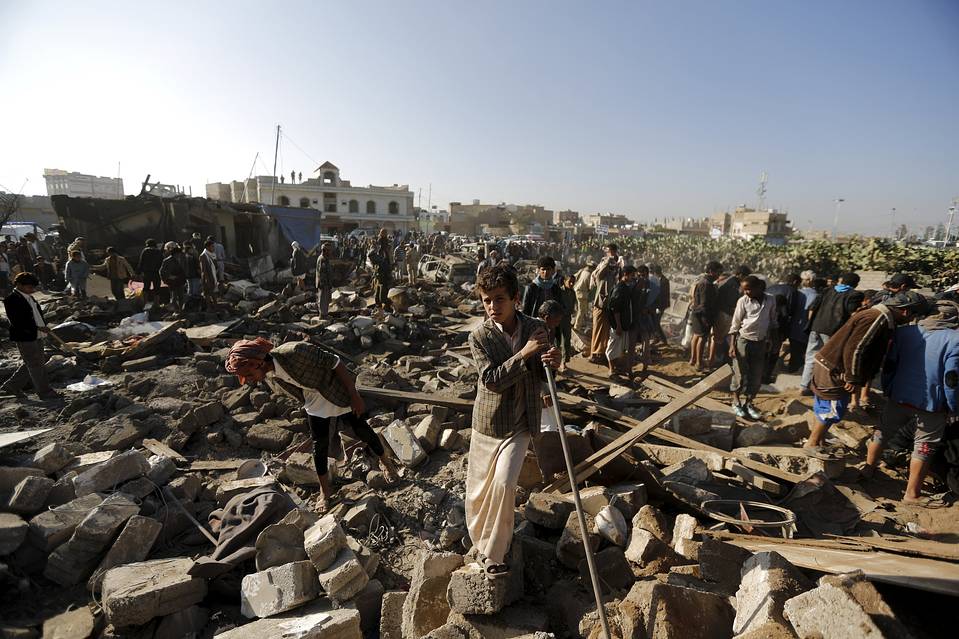
RNA - With the illegal war in its fourth year, Yemen’s economy is on the verge of collapse, infectious disease is rampant, and the Saudi-led invading forces pose an existential threat to the country. The regime-change war has left Yemen in what some are calling the world’s “largest humanitarian crisis to date.”
To put this situation into further perspective, consider that Yemen has a population of 27 million people. Approximately 18.8 million - 69 percent of the country’s population - is in need of immediate humanitarian assistance. The illegal blockade, airstrikes, instability, war, security threats, and a lack of basic infrastructure have prevented aid organizations from helping.
To make matters worse, just like Saudi Arabia, the United States has no interest in helping to mitigate this humanitarian crisis. Quite the opposite, it prevents a political settlement to end the war – even though this could negatively affect regional stability and be disastrous for US interests.
And no, the fighting between the Houthi Ansarullah and the Saudi-led forces is not symbolic of a much larger struggle between Iran and Saudi Arabia. There are no Iranian forces there to undermine Saudi influence in the Arab world and increase Tehran’s own. It’s a myth that feeds the Iranophobia flames and misreads the events in the country and throughout the region.
Yemen’s only sin is that it has geo-strategic importance. The country borders two US allies and sits at the convergence point of the Red Sea and the Gulf of Aden, overlooking the Bab el Mandab Strait - a key trade route, particularly for oil. A daily 4.7 million barrels of oil are transported through that strait. At its most narrow point, the Bab el Mandab is only 18 miles wide, meaning that ships must pass closely together, usually only two at a time. Serious disruptions of this route could constrict the flow of Persian Gulf oil to Europe and the western hemisphere and raise world oil prices.
The Saudis claim as the war continues and Iranian influence grows, Tehran may seek to expand its leverage by escalating the potential threat to ships passing through the waterways. Again, this is rubbish. It is the Saudi-led war that has been devastating for Yemen’s civilians and regional stability. Iran has always been trying to encourage a political settlement. It is Saudi Arabia and the United States who are not willing to see it into fruition. To prove the claim, it would be enough to note that the Gulf of Aden was an insecure waterway and ships came under attack by the Somali pirates on a daily basis. But since Iran's naval forces deployed in there, they have secured voyage not just for Iranian vessels, but also for all cargo ships and oil tankers of the world countries. A major part of the several thousand anti-piracy missions conducted by the Iranian Navy has been for the rescue of foreign ships. In one of such cases, they rescued a Chinese vessel that later brought Beijin's official appreciation and admiration for the brave mission.
Any settlement will be impossible until Saudis stop stoking the fire with their indiscriminate airstrikes. Without a solution to end the airstrikes, Yemen’s humanitarian crisis will only get worse. It gets worse. With the US military already fueling Saudi jets, the White House is escalating the conflict, from sending troops to the border regions to further intelligence sharing and direct US military intervention in the war. The United Nations can stop the US from fueling the bloodshed. But it is doing nothing even though there's an American imprint on every civilian life lost there.
According to Fars News Agancy, this conflict is not complex and multi-faceted. On the surface, it is a power struggle among the political elite, but it is in fact driven by long-term American-Israeli-Saudi designs for the region at the expense and marginalization of the majority of the Yemeni population. Their gambit to control the region has helped fuel the ongoing war, and must be addressed to bring lasting peace.
More than three years of UN-led negotiations to end Yemen’s war have failed. This failure is a result of American-Saudi dominated process at the Human Rights Council unwilling to take responsibility for the bloodshed and stop the conflict. Peace talks have failed because the US insists they should also include negotiations on the division of Yemen.
The US is not genuinely interested in ending the conflict. According to the most recent reports by human rights groups, the Americas have taken advantage of the conflict to develop a wide range of income streams through arms sales and other illicit activities. For the Military-Industrial Complex, the war is a luxury they can afford for many more years. They know that a peace deal is bad for business. It will also require the removal of their occupying forces and closing of their illegal military bases they have built around Yemen over the past few years.
847/940